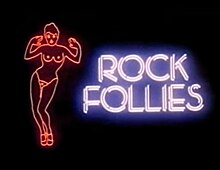
Douglas Glenn Colvin, better known by his stage name Dee Dee Ramone, was an American musician. He was the bassist and a founding member of the punk rock band the Ramones. Throughout the band's existence, he was the most prolific lyricist and composer, writing many of their best-known songs, such as "53rd & 3rd", "Chinese Rock", "Commando", "Wart Hog", "Rockaway Beach", "Poison Heart" and "Bonzo Goes To Bitburg". The latter won the New York Music Award for best independent single of the year in 1986, while Animal Boy, which the song is from, won for best album.

The Runaways were an American rock band who recorded and performed from 1975 to 1979. Formed in 1975 in Los Angeles, the band released four studio albums and one live album during its run. Among their best-known songs are "Cherry Bomb", "Hollywood", "Queens of Noise" and a cover version of the Velvet Underground's "Rock & Roll". Never a major success in the United States, the Runaways became a sensation overseas, especially in Japan, thanks to the single "Cherry Bomb".

Jackie DeShannon is an American singer-songwriter and radio broadcaster who has had many hit song credits beginning in the 1960s, as both a singer and composer. She was one of the first female singer-songwriters of the rock and roll period. She is best known as the singer of "What the World Needs Now Is Love" and "Put a Little Love in Your Heart". She is the writer of "When You Walk in the Room" and "Bette Davis Eyes", which became hits for The Searchers and Kim Carnes, respectively.
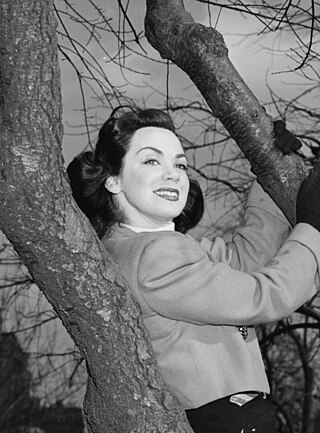
Kitty Kallen was an American singer whose career spanned from the 1930s to the 1960s, to include the Swing era of the Big Band years, the post-World War II pop scene and the early years of rock 'n roll. Kallen performed with popular big band leaders of the 1940s, including Jimmy Dorsey and Harry James, before establishing a solo career.
Rula Lenska is an English actress. She mainly appears in British stage and television productions and is known in the United States for a series of television advertisements in the 1970s and 1980s. She is known for the films Queen Kong and Aura, and she portrayed Claudia Colby in the ITV soap opera Coronation Street.
Julie Covington is an English singer and actress, best known for recording the original version of "Don't Cry for Me Argentina", which she sang on the 1976 concept album Evita.

Beverle Lorence "Bebe" Buell is an American singer and former model. She was Playboy magazine's November 1974 Playmate of the Month. Buell moved to New York in 1972 after signing a modeling contract with Eileen Ford, and garnered notability after her publicized relationship with musician Todd Rundgren from 1972 until 1978, as well as her liaisons with several rock musicians during that time and over the following four decades. She is the mother of actress Liv Tyler, whose biological father is Aerosmith frontman Steven Tyler. Todd Rundgren is Liv's legally adoptive father.

Leave Home is the second studio album by the American punk rock band Ramones. It was released on January 10, 1977, through Sire Records, with the expanded CD being released through Rhino Entertainment on June 19, 2001. Songs on the album were written immediately after the band's first album's writing process, which demonstrated the band's progression. The album had a higher production value than their debut Ramones and featured higher tempos. The front photo was taken by Moshe Brakha and the back cover, which would become the band's logo, was designed by Arturo Vega. The album spawned three singles, but only one succeeded in charting. It was also promoted with several tour dates in the United States and Europe.
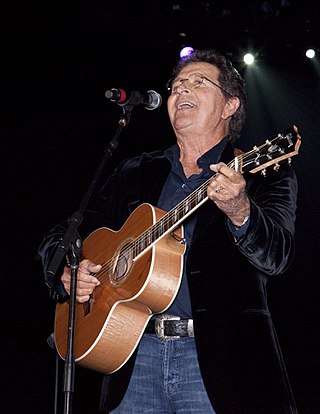
Morris Mac Davis was an American songwriter, singer, performer, and actor. A native of Lubbock, Texas, he enjoyed success as a crossover artist and writing for Elvis Presley during his early career, providing him with the hits "Memories", "In the Ghetto", "Don't Cry Daddy", and "A Little Less Conversation". A subsequent solo career in the 1970s produced hits such as "Baby Don't Get Hooked on Me". Davis also starred in his own variety show, a Broadway musical, and various films and TV shows.

Katie Rox is a Canadian singer-songwriter from a farm on the outskirts of Airdrie, Alberta, who lives in Vancouver, British Columbia. She performed in the past under the name Katie B.
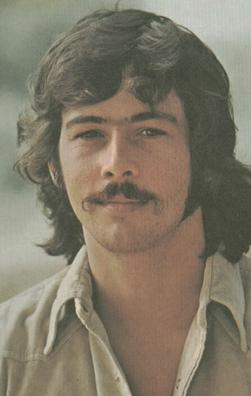
Michael Gene Botts was an American drummer, best known for his work with 1970s soft rock band Bread, and as a session musician. During his career, he recorded with Linda Ronstadt, Karla Bonoff, Andrew Gold, Olivia Newton-John, Peter Cetera, Anne Murray, Warren Zevon and Dan Fogelberg, among many others. He also contributed to several soundtracks for films, and to albums released under the name of The Simpsons. Although known primarily as a drummer, Botts also contributed backing vocals to some Bread songs.
Sue Jones-Davies is a Welsh actress, singer and local politician. She played Judith Iscariot in the film Monty Python's Life of Brian (1979) and was Mayor of Aberystwyth from 2008 to 2009.
Charlotte Cornwell was an English actress, singer, and a teacher of acting on the faculty at the University of Southern California (2003–2012).

Dee Hoty is an American actress known for her work in musical theatre. Over the course of her career, she has appeared in numerous Broadway productions and earned three Tony Award nominations for Best Actress in a Musical, for The Will Rogers Follies (1991), The Best Little Whorehouse Goes Public (1994), and Footloose (1999).
Dee Palmer is an English composer, arranger, and keyboardist best known for having been a member of the progressive rock group Jethro Tull from 1976 to 1980.
Jennifer Abod is an American feminist activist, musician, journalist, and filmmaker.
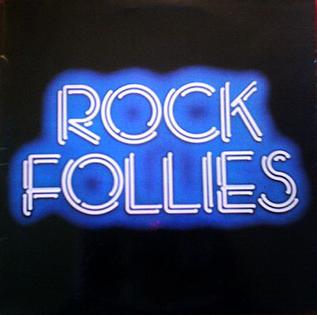
Rock Follies is a soundtrack album of the 1976 UK television series Rock Follies. The album featured songs from the show, sung by stars Julie Covington, Charlotte Cornwell and Rula Lenska. The songs were composed by Howard Schuman and Roxy Music's Andy Mackay. The album reached No.1 in the UK album charts.
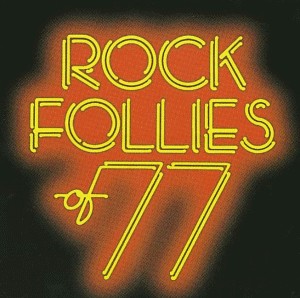
Rock Follies of '77 is a soundtrack album of the second series of the UK television drama Rock Follies. Released in 1977 on Polydor Records in both the UK and the US, the album contained 12 tracks from the series as performed by the stars Julie Covington, Charlotte Cornwell and Rula Lenska. In addition, cast member Sue Jones-Davies was a vocalist on many tracks, including the album's hit single "O.K.?" which reached #10 in June 1977.
Richard Blaine Williams was an American singer. He and his brothers, Bob, Don, and Andy Williams, performed as a quartet, The Williams Brothers.
"The Ladies Who Lunch" is a song from the Broadway musical Company, sung by the character Joanne. It was written by Stephen Sondheim, and was introduced by Elaine Stritch. It became her signature song.
